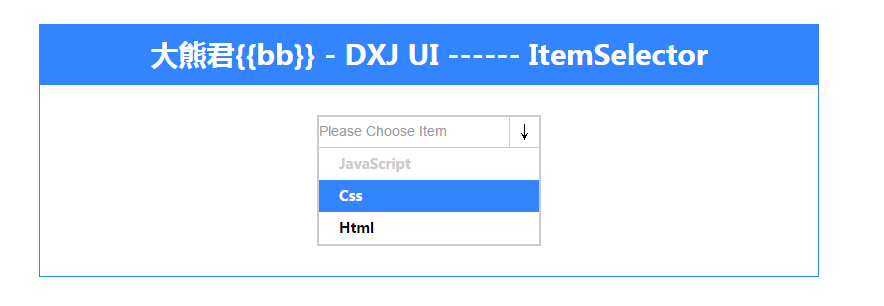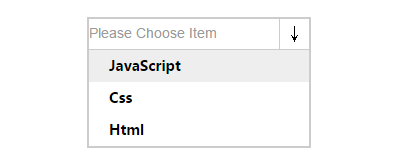大熊君JavaScript插件化开发------(实战篇之DXJ UI ------ ItemSelector重构完结版)
一,开篇分析
Hi,大家好!大熊君又和大家见面了,还记得上一篇文章吗。主要讲述了以“jQuery的方式如何开发插件”,以及过程化设计与面向对象思想设计相结合的方式是
如何设计一个插件的,两种方式各有利弊取长补短,本系列文章是以学习为导向的,具体场景大家自己定夺使用方式。那么今天这篇文章我们说点什么那?嘿嘿嘿
。我们接着上篇文章对不足的地方进行重构,以深入浅出的方式来逐步分析,让大家有一个循序渐进提高的过程。废话少说,进入正题。让我们先来回顾一下之前的
Js部分的代码,如下:
1 function ItemSelector(elem,opts){ 2 this.elem = elem ; 3 this.opts = opts ; 4 } ; 5 var ISProto = ItemSelector.prototype ; 6 ISProto.getElem = function(){ 7 return this.elem ; 8 } ; 9 ISProto.getOpts = function(){ 10 return this.opts ; 11 } ; 12 /* data manip*/ 13 ISProto._setCurrent = function(current){ 14 this.getOpts()["current"] = current ; 15 } ; 16 ISProto.getCurrentValue = function(current){ 17 return this.getOpts()["current"] ; 18 } ; 19 /* data manip*/ 20 ISProto.init = function(){ 21 var that = this ; 22 this.getOpts()["current"] = null ; // 数据游标 23 this._setItemValue(this.getOpts()["currentText"]) ; 24 var itemsElem = that.getElem().find(".content .items") ; 25 this.getElem().find(".title div").on("click",function(){ 26 itemsElem.toggle() ; 27 }) ; 28 this.getElem().find(".title span").on("click",function(){ 29 itemsElem.toggle() ; 30 }) ; 31 $.each(this.getOpts()["items"],function(i,item){ 32 item["id"] = (new Date().getTime()).toString() ; 33 that._render(item) ; 34 }) ; 35 } ; 36 ISProto._setItemValue = function(value){ 37 this.getElem().find(".title div").text(value) 38 } ; 39 ISProto._render = function(item){ 40 var that = this ; 41 var itemElem = $("<div></div>") 42 .text(item["text"]) 43 .attr("id",item["id"]) ; 44 if("0" == item["disabled"]){ 45 itemElem.on("click",function(){ 46 var onChange = that.getOpts()["change"] ; 47 that.getElem().find(".content .items").hide() ; 48 that._setItemValue(item["text"]) ; 49 that._setCurrent(item) ; 50 onChange && onChange(item) ; 51 }) 52 .mouseover(function(){ 53 $(this).addClass("item-hover") ; 54 }) 55 .mouseout(function(){ 56 $(this).removeClass("item-hover") ; 57 }) ; 58 } 59 else{ 60 itemElem.css("color","#ccc").on("click",function(){ 61 that.getElem().find(".content .items").hide() ; 62 that._setItemValue(item["text"]) ; 63 }) ; 64 } 65 itemElem.appendTo(this.getElem().find(".content .items")) ; 66 } ;
效果如下图所示:

a)------非可操作状态

b)------可操作状态

(二),打开思路,进行重构
大家从代码不难看出,已经通过“Js”中的语法特性,以面向对象的方式进行了有效的组织,比松散的过程化形式的组织方式好多了,但是仍然会发现有很多不足的地方。
(1),里面重复代码太多
(2),职责划分不清晰
(3),流程梳理不健全
我们基于以上几点进行有效的重构,我们首先要梳理一下这个组件的需求,功能点如下:
(1),初始化配置组件
1 $(function(){ 2 var itemSelector = new ItemSelector($("#item-selector"),{ 3 currentText : "Please Choose Item" , 4 items : [ 5 { 6 text : "JavaScript" , 7 value : "js" , 8 disabled : "1" 9 } , 10 { 11 text : "Css" , 12 value : "css" , 13 disabled : "0" 14 } , 15 { 16 text : "Html" , 17 value : "html" , 18 disabled : "0" 19 } 20 ] , 21 }) ; 22 itemSelector.init() ; 23 }) ;
这块代码很清晰,不需要做任何修改,但是大家可以基于以上配置扩展功能,比如增加配置项“mode”支持多种选项方式。如:“checkbox勾选模式”。
接下来是要完成初始化逻辑,如下:
1 ISProto.init = function(){ 2 var that = this ; 3 this.getOpts()["current"] = null ; // 数据游标 4 this._setItemValue(this.getOpts()["currentText"]) ; 5 var itemsElem = that.getElem().find(".content .items") ; 6 this.getElem().find(".title div").on("click",function(){ 7 itemsElem.toggle() ; 8 }) ; 9 this.getElem().find(".title span").on("click",function(){ 10 itemsElem.toggle() ; 11 }) ; 12 $.each(this.getOpts()["items"],function(i,item){ 13 item["id"] = (new Date().getTime()).toString() ; 14 that._render(item) ; 15 }) ; 16 } ;
这段代码问题很多,职责不明确,初始化逻辑包含了功能点的细节实现。
再继续看渲染部分代码:
1 ISProto._render = function(item){ 2 var that = this ; 3 var itemElem = $("<div></div>") 4 .text(item["text"]) 5 .attr("id",item["id"]) ; 6 if("0" == item["disabled"]){ 7 itemElem.on("click",function(){ 8 var onChange = that.getOpts()["change"] ; 9 that.getElem().find(".content .items").hide() ; 10 that._setItemValue(item["text"]) ; 11 that._setCurrent(item) ; 12 onChange && onChange(item) ; 13 }) 14 .mouseover(function(){ 15 $(this).addClass("item-hover") ; 16 }) 17 .mouseout(function(){ 18 $(this).removeClass("item-hover") ; 19 }) ; 20 } 21 else{ 22 itemElem.css("color","#ccc").on("click",function(){ 23 that.getElem().find(".content .items").hide() ; 24 that._setItemValue(item["text"]) ; 25 }) ; 26 } 27 itemElem.appendTo(this.getElem().find(".content .items")) ; 28 } ;
问题很明显,发现了重复性的操作,应该进行合理的抽象,已达到复用的目的。
整个组建的流程包括初始化,渲染(事件绑定),还有就是相关的数据操作方法以及dom操作的辅助方法。
综上所述,经过简单的梳理后,我们应该建立起功能的操作目的以及流程主线的任务分配,各负其责。
所以我们重构的目的很明确了,对!就是进行功能点的抽象,友好的职责划分,那么我们如何实现那?
第一步,建立流程功能方法:(方法接口)
ISProto.init = function(){ // put you code here ! } ; ISProto._render = function(){ // put you code here ! } ;
第二部,建立抽象后的方法接口:
ISProto._fnItemSelectorDelegateHandler = function(){ // put you code here ! } ; ISProto._fnTriggerHandler = function(){ // put you code here ! } ; ISProto._addOrRemoveClass = function(){ // put you code here ! } ;
第三步,建立数据操作接口:
1 ISProto._setCurrent = function(){ 2 // put you code here ! 3 } ; 4 ISProto._getCurrent = function(){ 5 // put you code here ! 6 } ;
还有一些参照下面的完整源码,这里只是说的思路。
(三),完整代码以供学习,本代码已经过测试
function ItemSelector(elem,opts){
this.elem = elem ;
this.opts = opts ;
this.current = -1 ; // 数据游标
} ;
var ISProto = ItemSelector.prototype ;
/* getter api*/
ISProto.getElem = function(){
return this.elem ;
} ;
ISProto.getOpts = function(){
return this.opts ;
} ;
ISProto._getCurrent = function(){
return this.current ;
} ;
/* getter api*/
/* data manip*/
ISProto._setCurrent = function(current){
this.current = current ;
} ;
ISProto._setItemText = function(text){
this.getElem().find(".title div").text(text) ;
} ;
/* data manip*/
/* update on 2015 1/31 23:38 */
ISProto._fnTriggerHandler = function(index,text,value){
if(this._isDisabled(value)){
index = -1 ;
text = this.getOpts()["currentText"] ;
}
this._setItemText(text) ;
this._setCurrent(index) ;
this.getElem().find(".content .items").hide() ;
} ;
ISProto._addOrRemoveClass = function(elem,className,addIs){
if(addIs){
elem.addClass(className) ;
}
else{
elem.removeClass(className) ;
}
} ;
ISProto._fnItemSelectorDelegateHandler = function(){
var that = this ;
this.getElem().on("click","[data-toggle]",function(){
that.getElem().find(".content .items").toggle() ;
}) ;
} ;
ISProto._isDisabled = function(value){
return ("1" == value) ? true : false ;
} ;
/* update on 2015 1/31 23:38 */
ISProto.init = function(){
var that = this ;
this._fnItemSelectorDelegateHandler() ;
$.each(this.getOpts()["items"],function(i,item){
item["index"] = i ;
that._render(item) ;
}) ;
this._fnTriggerHandler(this._getCurrent(),this.getOpts()["currentText"],"1") ;
} ;
ISProto._render = function(item){
var that = this ;
var itemElem = $("<div></div>").text(item["text"]).attr("id",item["index"]) ;
var activeClass = ("0" == item["disabled"]) ? "item-hover" : "item-disabled-hover" ;
itemElem.on("click",function(){
that._fnTriggerHandler(item["index"],item["text"],item["disabled"]) ;
})
.mouseover(function(){
that._addOrRemoveClass($(this),activeClass,true) ;
})
.mouseout(function(){
that._addOrRemoveClass($(this),activeClass,false) ;
}) ;
itemElem.appendTo(this.getElem().find(".content .items")) ;
} ;
(四),最后总结
(1),面向对象的思考方式合理分析功能需求。
(2),以类的方式来组织我们的插件逻辑。
(3),不断重构上面的实例,如何进行合理的重构那?不要设计过度,要游刃有余,推荐的方式是过程化设计与面向对象思想设计相结合。
(4),下篇文章中会扩展相关功能,比如“mode”这个属性,为"1"时支持checkbox多选模式,现在只是默认下拉模式。
哈哈哈,本篇结束,未完待续,希望和大家多多交流够沟通,共同进步。。。。。。呼呼呼……(*^__^*)


